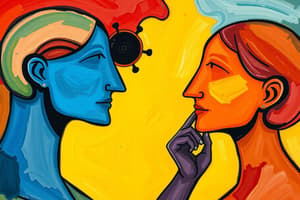Podcast
Questions and Answers
Making value judgements based on senses and feelings is a core part of ethics.
Making value judgements based on senses and feelings is a core part of ethics.
False (B)
Understanding ethics is considered trivial in nature.
Understanding ethics is considered trivial in nature.
False (B)
Morals are based on individual beliefs and attitudes.
Morals are based on individual beliefs and attitudes.
True (A)
If one's beliefs align with societal expectations, it is considered immoral.
If one's beliefs align with societal expectations, it is considered immoral.
Moral reasoning for ethics involves logically projecting facts and figures to assess human behavior.
Moral reasoning for ethics involves logically projecting facts and figures to assess human behavior.
In moral reasoning, the focus is on arriving at judgments based on personal feelings rather than facts.
In moral reasoning, the focus is on arriving at judgments based on personal feelings rather than facts.
Ethics is the study of ideal ways of human behavior and ideal ways of thinking.
Ethics is the study of ideal ways of human behavior and ideal ways of thinking.
Moral dilemmas occur when people are certain about the right course of action.
Moral dilemmas occur when people are certain about the right course of action.
Our decision-making during moral dilemmas heavily relies on external factors like rewards and punishments.
Our decision-making during moral dilemmas heavily relies on external factors like rewards and punishments.
Understanding ethics is solely based on universal principles rather than personal values.
Understanding ethics is solely based on universal principles rather than personal values.
Moral theory helps individuals judge others based on their personal values.
Moral theory helps individuals judge others based on their personal values.
Moral valuation can make individuals face moral issues that challenge their personal values.
Moral valuation can make individuals face moral issues that challenge their personal values.
Flashcards are hidden until you start studying




